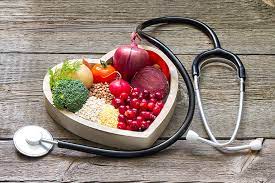Heart disease remains one of the leading causes of death worldwide. While genetics and other uncontrollable factors play a role, diet is one of the most powerful tools in preventing and managing heart disease. The food we eat directly affects cholesterol levels, blood pressure, inflammation, and weight—all of which influence cardiovascular health.
This article explains how specific dietary choices can reduce your risk of heart disease and support a strong, healthy heart over time.
How Diet Affects Heart Health
Everything you consume affects your cardiovascular system either positively or negatively. Poor eating habits—such as consuming high levels of saturated fats, trans fats, sugar, and sodium—can lead to:
- Plaque buildup in arteries (atherosclerosis)
- High blood pressure (hypertension)
- High LDL (“bad”) cholesterol
- Increased risk of heart attacks and strokes
- Obesity and type 2 diabetes
On the other hand, a heart-friendly diet promotes:
- Healthy blood vessel function
- Lower cholesterol and blood pressure
- Reduced inflammation
- Better weight control
Heart-Healthy Nutrients and Their Benefits
Certain nutrients are especially important for cardiovascular protection:
| Nutrient | Benefit | Food Sources |
|---|---|---|
| Omega-3 Fatty Acids | Reduce inflammation, lower triglycerides | Fatty fish (salmon, sardines), flaxseeds, walnuts |
| Fiber | Lowers LDL cholesterol | Oats, beans, lentils, fruits, vegetables |
| Potassium | Regulates blood pressure | Bananas, spinach, sweet potatoes |
| Antioxidants | Fight oxidative stress | Berries, dark chocolate, green tea |
| Magnesium | Supports heartbeat and blood pressure | Nuts, seeds, whole grains |
Best Diet Patterns for Heart Health
Mediterranean Diet
The Mediterranean diet is one of the most recommended for heart health. It includes:
- Plenty of vegetables, fruits, whole grains
- Olive oil as the main source of fat
- Moderate consumption of fish and poultry
- Limited red meat and processed foods
It’s rich in antioxidants, healthy fats, and fiber—helping reduce blood pressure and cholesterol levels.
DASH Diet (Dietary Approaches to Stop Hypertension)
Designed specifically to fight high blood pressure, the DASH diet emphasizes:
- Fruits and vegetables
- Whole grains
- Lean proteins
- Low-fat dairy
- Low sodium and sugar intake
This diet is known to reduce both systolic and diastolic blood pressure naturally.
Plant-Based Diets
Plant-based diets, including vegetarian and vegan eating patterns, are rich in fiber, phytonutrients, and antioxidants. They help reduce cholesterol, inflammation, and improve weight management—leading to a lower risk of heart disease.
Foods That Help Prevent Heart Disease
- Leafy Greens: High in nitrates and antioxidants; improve artery function
- Berries: Contain polyphenols that reduce blood pressure and cholesterol
- Nuts (especially almonds and walnuts): Good fats and fiber to lower LDL
- Oats: Beta-glucan fiber reduces cholesterol absorption
- Avocados: Loaded with heart-healthy monounsaturated fats
- Beans and Lentils: Excellent source of protein and soluble fiber
- Olive Oil: Anti-inflammatory and cholesterol-lowering properties
- Fatty Fish (like salmon and mackerel): Rich in omega-3s for heart rhythm support
Foods to Limit or Avoid
Avoiding or limiting certain foods can significantly reduce your heart disease risk:
| Food Type | Why It’s Harmful |
|---|---|
| Trans Fats | Raise LDL and lower HDL cholesterol |
| Excess Sodium | Raises blood pressure |
| Refined Sugars | Increases obesity and inflammation |
| Processed Meats | High in sodium and saturated fat |
| Sugary Beverages | Lead to weight gain and insulin resistance |
Portion Control and Meal Timing
Overeating—even healthy foods—can lead to weight gain, which stresses the heart. Use these strategies:
- Eat smaller, frequent meals throughout the day
- Avoid late-night snacking
- Practice mindful eating by chewing slowly and recognizing fullness
Hydration and Heart Health
Staying hydrated keeps your blood volume stable and supports healthy blood pressure. Drink water throughout the day and limit sugary or caffeinated beverages.
Practical Tips for a Heart-Healthy Diet
- Cook at home more often to control ingredients
- Choose whole grains instead of refined carbs
- Bake or grill instead of frying
- Read nutrition labels to spot hidden sodium or sugars
- Add herbs and spices instead of salt for flavor
Sample Daily Heart-Healthy Meal Plan
| Meal | Example |
|---|---|
| Breakfast | Oatmeal with berries and walnuts + green tea |
| Lunch | Grilled chicken salad with olive oil dressing |
| Snack | Hummus with carrot sticks or a banana |
| Dinner | Baked salmon with quinoa and steamed broccoli |
| Drink | Water or unsweetened herbal tea |
Conclusion
A heart-healthy diet isn’t about strict limitations—it’s about making informed, consistent food choices that support cardiovascular function. Incorporating whole, natural foods while avoiding processed and harmful options can dramatically lower your risk of heart disease. With the right nutrition, you’re not just feeding your body—you’re protecting your heart for the long run.
FAQs
1. Can I eat fats on a heart-healthy diet?
Yes, but focus on unsaturated fats from sources like nuts, avocados, and olive oil while avoiding trans and saturated fats.
2. How much salt is safe for heart health?
Most health experts recommend limiting sodium to under 1,500 mg per day, especially if you have high blood pressure.
3. Is red meat completely off-limits?
Not necessarily, but it should be limited. Lean cuts and occasional servings are fine, but processed meats should be avoided.
4. Are all carbohydrates bad for the heart?
No, whole grains like oats, brown rice, and quinoa are good for heart health. Refined carbs like white bread and sugar should be limited.
5. Can changing my diet reverse heart disease?
In some cases, particularly in early stages, a healthy diet combined with lifestyle changes can help reverse damage and improve heart function.
